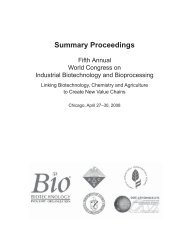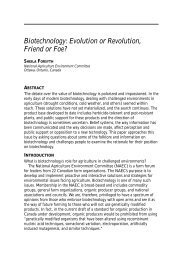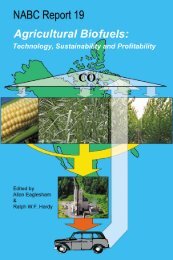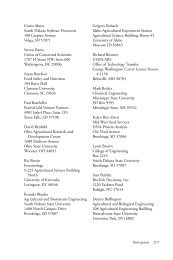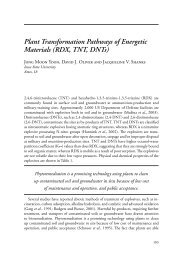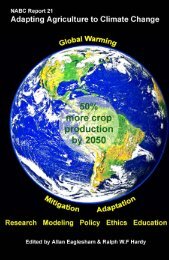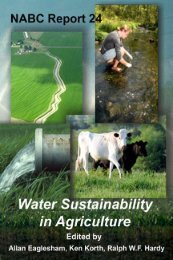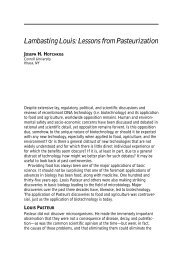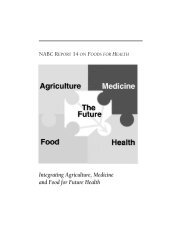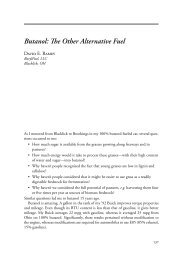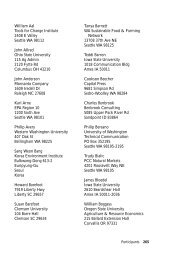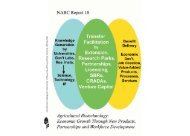- Page 2: 2011National Agricultural Biotechno
- Page 5 and 6: NABC Report 23Food Security: The In
- Page 7: AcknowledgmentsNABC’s twenty-thir
- Page 11 and 12: 123 Preparing for Emerging and Unkn
- Page 13 and 14: Food Security: The Intersection of
- Page 15 and 16: These interconnected threads demand
- Page 17 and 18: In the developed world, it will req
- Page 19 and 20: On the other hand, his definition o
- Page 21 and 22: Plenary Session 4. Emerging Biotech
- Page 23 and 24: 12 Food Security: The Intersection
- Page 25 and 26: 14 Food Security: The Intersection
- Page 27 and 28: The participants’ responses did n
- Page 29 and 30: they are safe. Cultural barriers ca
- Page 31 and 32: • Hydrological mapping, as in Min
- Page 33 and 34: • Food security is a multidiscipl
- Page 35 and 36: 24 Food Security: The Intersection
- Page 37 and 38: 26 Food Security: The Intersection
- Page 39 and 40: awareness beyond anything that advo
- Page 41 and 42: • Some research results indicate
- Page 43 and 44: change, reduce or remove GHG emissi
- Page 45 and 46: perspectives and priorities differ
- Page 47 and 48: 36 Food Security: The Intersection
- Page 49 and 50: Water• Withdrawals from the Color
- Page 51 and 52: Efficient Use of Resources• We ne
- Page 53 and 54: • Foley is working with Google to
- Page 55 and 56: drinking water, stormwater, agricul
- Page 57 and 58: Table 1A. Issues, strategies and de
- Page 59 and 60:
The Framework in Summary—A Ten- a
- Page 61 and 62:
If funded, Research Implementation
- Page 63 and 64:
If funded, Research Implementation
- Page 65 and 66:
to be initiated in the first five y
- Page 67 and 68:
Deborah Swackhamer is professor and
- Page 69 and 70:
These under-nutrition woes are not
- Page 71 and 72:
gies. Agricultural sustainability r
- Page 73 and 74:
Investment in TechnologyImproved pe
- Page 75 and 76:
Last November, the Forum announced
- Page 77 and 78:
Syngenta Foundation for Sustainable
- Page 79 and 80:
Food and Agriculture Organization (
- Page 81 and 82:
70 Food Security: The Intersection
- Page 83 and 84:
Richard Isaacson (University of Min
- Page 85 and 86:
possibility of cross-pollination th
- Page 87 and 88:
in part to companies like Cargill w
- Page 89 and 90:
Ralph Hardy (National Agricultural
- Page 91 and 92:
and the impacts those things have o
- Page 93 and 94:
82 Food Security: The Intersection
- Page 95 and 96:
Analyses of multiple de-greening ci
- Page 97 and 98:
June Medford, a professor of biolog
- Page 99 and 100:
Genetically Modified CropsIt is cle
- Page 101 and 102:
the toxin levels are higher than wo
- Page 103 and 104:
• Separate common species• Sepa
- Page 105 and 106:
We have a similar situation in the
- Page 107 and 108:
ReferencesLövei GL et al. (2009) T
- Page 109 and 110:
Figure 1. Canada’s food-safety sy
- Page 111 and 112:
However, significant challenges rem
- Page 113 and 114:
confirmed cases in seven provinces,
- Page 115 and 116:
104 Food Security: The Intersection
- Page 117 and 118:
and from the IIASA Strategic Plan 2
- Page 119 and 120:
provided software support. We also
- Page 121 and 122:
Figure 4. Biological agents (classi
- Page 123 and 124:
112 Food Security: The Intersection
- Page 125 and 126:
Detlof von Winterfeldt is the direc
- Page 127 and 128:
Medford: For things like explosives
- Page 129 and 130:
Robert Buchanan (University of Mary
- Page 131 and 132:
Ishimaru: In particular with wheat,
- Page 133 and 134:
Duplessis: In terms of microfluidic
- Page 135 and 136:
124 Food Security: The Intersection
- Page 137 and 138:
Emergence/Re-EmergenceRegarding eme
- Page 139 and 140:
• Anticipate and prevent the emer
- Page 141 and 142:
AcuteWith a new emergence, the need
- Page 143 and 144:
Assessing Immune StatusDuring an ou
- Page 145 and 146:
Table 1. Recent zoonotic agents ide
- Page 147 and 148:
Figure 2. The impact of culling she
- Page 149 and 150:
ecognized as a new disease among ca
- Page 151 and 152:
The West Nile virus is another dram
- Page 153 and 154:
deer in an attempt to limit the tra
- Page 155 and 156:
disease centers for training, resea
- Page 157 and 158:
Lanciotti RS et al. (1999) Origin o
- Page 159 and 160:
148 Food Security: The Intersection
- Page 161 and 162:
Plant diseases still affect human h
- Page 163 and 164:
Climate ChangeThe predicted transit
- Page 165 and 166:
In addition to the NPDRS and the NP
- Page 167 and 168:
arely have a realistic understandin
- Page 169 and 170:
National Research Council (NRC) (20
- Page 171 and 172:
160 Food Security: The Intersection
- Page 173 and 174:
our universities we can increase aw
- Page 175 and 176:
evidence and no microbiologic evide
- Page 177 and 178:
food-preservation technologies and
- Page 179 and 180:
concern, particular products of con
- Page 181 and 182:
170 Food Security: The Intersection
- Page 183 and 184:
172 Food Security: The Intersection
- Page 185 and 186:
PreventionMuch can and should be do
- Page 187 and 188:
Figure 3. Selected recent multi-sta
- Page 189 and 190:
Figure 6. PulseNet electronic commu
- Page 191 and 192:
Figure 10. All Salmonella Typhimuri
- Page 193 and 194:
Figure 13. Listeriosis in the Unite
- Page 195 and 196:
Figure 15. Case definitions for clu
- Page 197 and 198:
Figure 18. The surveillance process
- Page 199 and 200:
Figure 20. Etiology of acute gastro
- Page 201 and 202:
190 Food Security: The Intersection
- Page 203 and 204:
I will discuss emerging intentional
- Page 205 and 206:
low-level contamination is on-going
- Page 207 and 208:
Sometimes these supply chains fall
- Page 209 and 210:
Clearly, the food system is globall
- Page 211 and 212:
Figure 13. 2010 Cocoa and cocoa-pre
- Page 213 and 214:
damage on those who profit from the
- Page 215 and 216:
target population. In their lives,
- Page 217 and 218:
it before it reaches the consumer.
- Page 219 and 220:
Shaun Kennedy is director of the Na
- Page 221 and 222:
ing replacements for cream, for exa
- Page 223 and 224:
safety system in reality by guarant
- Page 225 and 226:
Figure 2 shows the types of identif
- Page 227 and 228:
on better standards for Chinese sta
- Page 229 and 230:
Figure 6. Skim-milk-powder project:
- Page 231 and 232:
Jeffrey C. Moore is a scientific li
- Page 233 and 234:
John Besser: I was a little mystifi
- Page 235 and 236:
forensic purposes, as used with OJ
- Page 237 and 238:
226 Food Security: The Intersection
- Page 239 and 240:
my farmer friends thought I was cra
- Page 241 and 242:
Minnesota’s HeritageAs to why som
- Page 243 and 244:
in reality, legislation alone won
- Page 245 and 246:
The other aspect of this challenge
- Page 247 and 248:
private industry, enhancing the pro
- Page 249 and 250:
But it does seem that the United St
- Page 251 and 252:
Cathie Woteki is under secretary fo
- Page 253 and 254:
242 Food Security: The Intersection
- Page 255 and 256:
We offer the following comments and
- Page 257 and 258:
246 Food Security: The Intersection
- Page 259 and 260:
248 Food Security: The Intersection
- Page 261 and 262:
Ehlke, NancyUniversity of Minnesota
- Page 263 and 264:
Lumor, StephenUniversity of Minneso
- Page 265:
National Agricultural Biotechnology



